Have you ever tried to open one of your WordPress posts only to be greeted by a 404 error? At times, we experience that when we’re working on our own WordPress sites or helping our users
This error occurs when you can access your WordPress admin area and blog, but when you try to open a specific post, you’re met with a “404 Not Found” message.
It can be frustrating to see your content seemingly disappear, but we’ve found some workarounds to fix this issue. In this complete guide, we’ll show you how to fix WordPress posts returning 404 errors.
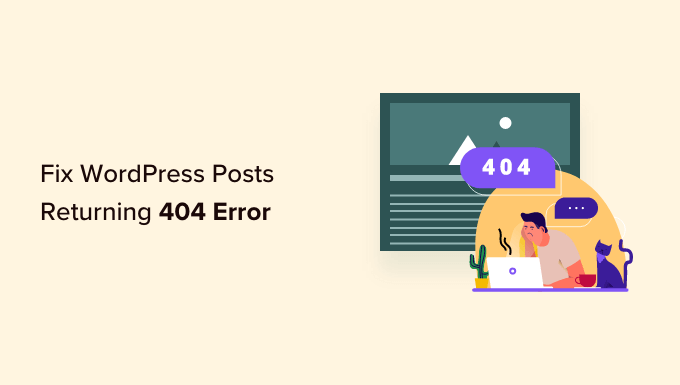
Why Are My WordPress Posts Returning a 404 Error?
There are several reasons why your posts might be showing a 404 “Page Not Found” error in WordPress. These can include:
- Plugin or theme conflicts: Sometimes, plugins or themes you’ve installed on your site can interfere with how WordPress handles permalinks. This can lead to broken links and 404 errors.
- Custom code issues: If you’ve added custom code to your website, there might be errors in the code that are affecting permalinks or causing other conflicts, resulting in 404 errors for your posts.
- Issues with your .htaccess file: The .htaccess file plays a role in how WordPress structures URLs. If this file is corrupted or missing, it can lead to 404 errors for your posts or pages.
How to Find All WordPress Posts With 404 Errors
Before we get to the solutions, it’d be good to figure out if this error is just happening to one or two posts or multiple posts. This way, you can determine the scope of the problem and choose the most appropriate solution.
One easy way to figure this out is to use Google Search Console. If you haven’t submitted your site to Google Search Console already, then read our guide on how to add your WordPress site to Google Search Console.
Once the Google bot has crawled and indexed your site, Google Search Console will then provide you with detailed information about your site’s performance, including any 404 errors it encounters.
To find out which posts are returning 404 errors, you can log in to the Search Console dashboard. Then, navigate to the ‘Pages’ report, and you will see a detailed list of all the errors.
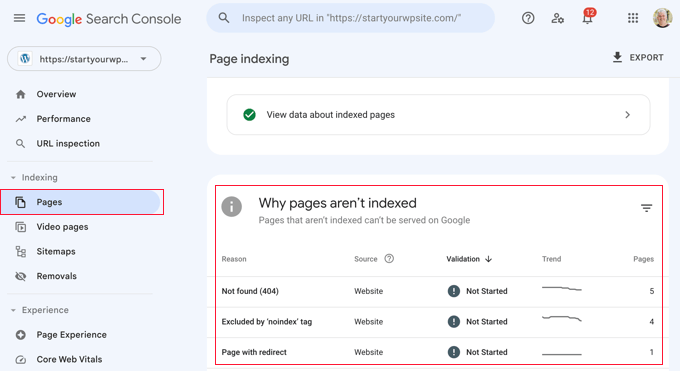
For more information, you can read our list of tips for using Google Search Console to grow website traffic, which includes some tips on how to fix 404 errors with the tool.
That being said, let’s look at how to fix WordPress posts returning 404 errors. You can use the links below to jump straight to different solutions:
No time to fix 404 errors yourself? WPBeginner Pro Services can help! With our affordable Emergency WordPress Support, you can hire experts to fix 404 errors, broken links, redirect issues, and much more. Stop stressing over WordPress issues and get them fixed! Schedule Emergency WordPress Support Services today!
Method 1: Check for Plugin or Theme Conflicts and Custom Code Issues
Sometimes, plugins, themes, or custom code you’ve added to your WordPress website can interfere with permalinks or cause conflicts, leading to 404 errors. We’ve even experienced it ourselves when we’re testing tools on our demo site.
One way to solve this problem is to temporarily deactivate plugins. Plugins can sometimes disrupt how WordPress handles links.
Once you’ve deactivated the plugins, you can reactivate them one by one while checking if the 404 error reappears after activating each plugin. If the error shows up after activating a specific plugin, that might be the culprit.
You can then do a quick Google search for solutions related to that plugin or contact the plugin developer for support.
Similarly, your WordPress theme might be causing the conflict.
To check, you can temporarily switch to a default WordPress theme like Twenty Twenty-Three or Twenty Twenty-Four. All you need to do is go to Appearance » Themes and click ‘Activate’ on a default theme.

If the 404 error disappears with the default theme, it indicates a potential conflict with your current theme. You can then try troubleshooting the theme or consider using a different theme.
You can check out our expert pick of the most popular WordPress themes for recommendations.
If you’ve recently inserted code snippets to your website, there might be errors in the code causing the 404 errors. Take a close look at the code you added and see if you can identify any mistakes.
The safest way to add code snippets to WordPress is with the WPCode plugin. This plugin lets you insert custom code without directly working with the theme files, reducing the risk of breaking your website.
Plus, whenever WPCode spots an error in your code, it will automatically deactivate the snippet and ask you to check it. You can also use the testing mode to check if your code works before pushing it to your live website.
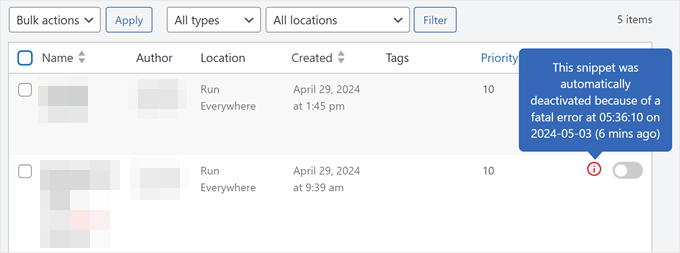
If none of these solutions work, move on to the next method where we’ll troubleshoot your permalink settings.
Method 2: Fix Your Permalink Settings
WordPress posts can return 404 errors because of problems with rewrite rules in your .htaccess file. In most cases, you can fix the problem by updating your permalink settings.
Simply go to Settings » Permalinks in your WordPress admin, and click on the ‘Save Changes’ button.
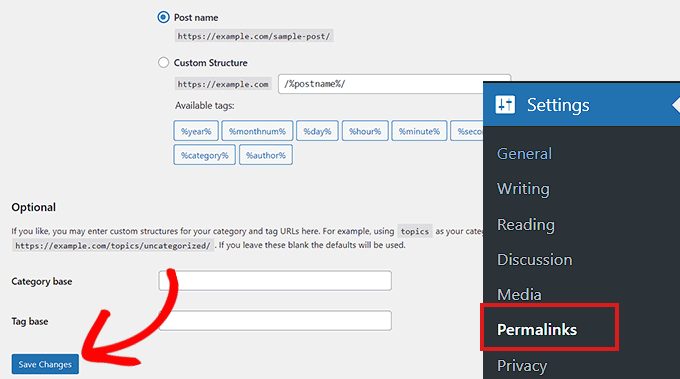
There is no need to make changes to the permalink settings themselves. This will update your permalink settings and flush the rewrite rules.
In most cases, this solution fixes the WordPress posts 404 error. However, if it does not work for you, then you probably need to update your .htaccess file manually.
Method 3: Update the WordPress .htaccess File
Before you start, make sure to back up your WordPress .htaccess file first. If something goes wrong, you can easily restore the original file.
Now, you will need to connect to your server using an FTP client like FileZilla or the File Manager app in your WordPress hosting dashboard.
Next, you will need to find and edit the .htaccess file, which is located in the same location as folders like /wp-content/ and /wp-includes/.
Simply right-click on the file and select ‘File permissions.’
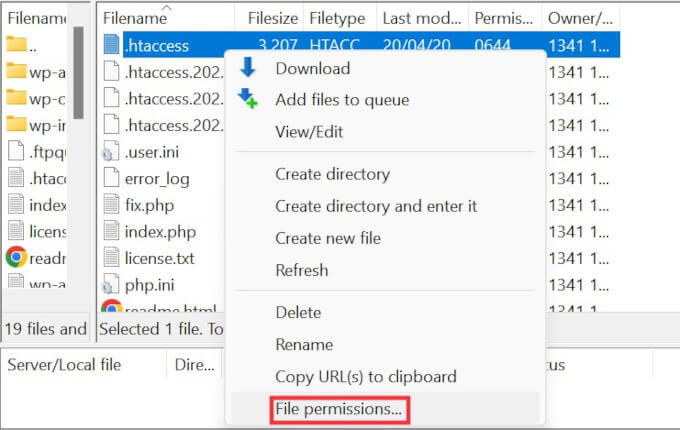
You can make the file writeable by changing its permissions to 666.
Simply enter ‘666’ into the ‘Numeric value’ box and then click on ‘OK’.
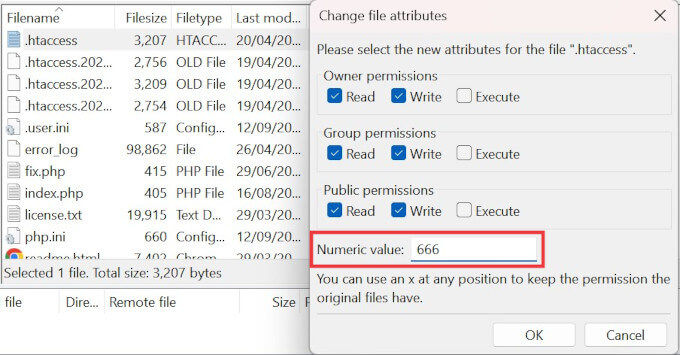
Then, you need to repeat the steps in the first method of our tutorial. Once you have done this, don’t forget to change the permissions back to 660.
You can also edit the file and add code to it.
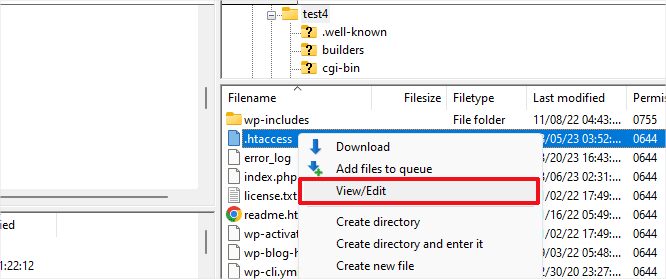
Once you have opened the .htaccess file with a text editor, simply insert this code:
# BEGIN WordPress
<IfModule mod_rewrite.c>
RewriteEngine On
RewriteBase /
RewriteRule ^index\.php$ - [L]
RewriteCond %{REQUEST_FILENAME} !-f
RewriteCond %{REQUEST_FILENAME} !-d
RewriteRule . /index.php [L]
</IfModule>
# END WordPress
Method 4: Contact Your Hosting Provider
If neither of the solutions above has fixed the WordPress posts returning 404 error, then we recommend contacting your WordPress hosting provider. There may be an error on their end, or they might be able to help you troubleshoot the problem.
Please also see our guide on how to properly ask for WordPress support and get it.
Method 5: Enable mod-rewrite (Local WordPress Installation)
If you are using a local server for testing purposes, then you will need to enable mod_rewrite in the Apache configuration of your MAMP, WAMP, or XAMPP site.
This will allow WordPress to generate clean URLs and prevent the 404 error for posts and pages on your local server.
How you do this will differ by the platform you use. People using XAMPP can open their control panel and click the ‘Config’ button within Actions. Then, select ‘Apache (httpd.conf).’
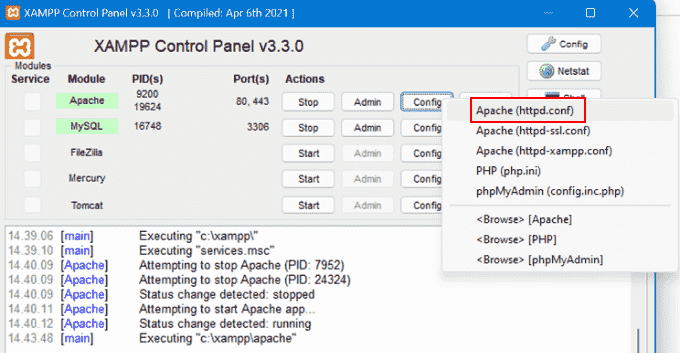
Next, you will need to find this line #LoadModule rewrite_module modules/mod_rewrite.so and remove the ‘#’ to uncomment it.
This will load the mod_rewrite.
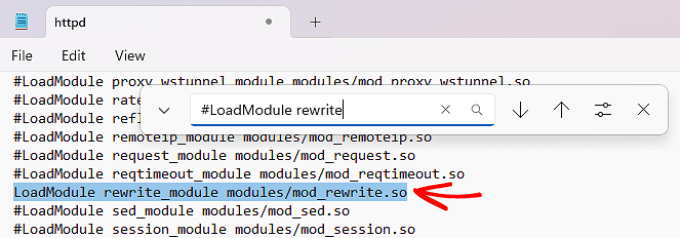
Then, find all instances of AllowOverride None and change them to AllowOverride All.
The ‘All’ value means that all directives can be overridden.
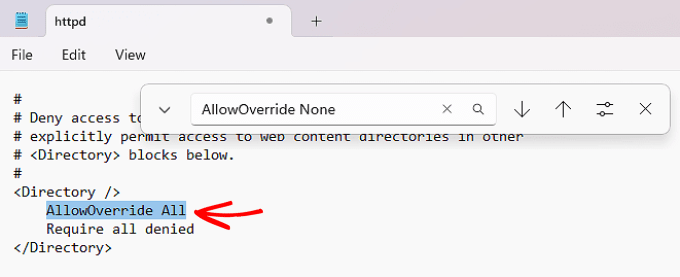
Once done, you can save the httpd.conf file and close it. After that, in the XAMPP control panel, click ‘Stop’ on the Apache module and ‘Start’ again to restart it.
Then, go back to your admin dashboard to see if your permalinks are working.
Video Tutorial
If you need visual instructions, then just watch the video below.
We hope this article helped you resolve the posts returning 404 errors in WordPress. You may also want to see our guide to the most common WordPress errors and how to fix them, along with our expert picks for the best WordPress plugins to grow your site.
If you liked this article, then please subscribe to our YouTube Channel for WordPress video tutorials. You can also find us on Twitter and Facebook.





Thomas Elkin II
Unfortunately, this has not helped me. Neither solution has worked. Anyone have another suggestion(s)?
Sharma Rahul
Gotta, thanks man !! saved my evening (y)
Javier Rodriguez
Waooo. one week trying to find what was wrong and it was the WAMP problem. fix it with one click. thanks a lot
Ben
Thank you. Clear advice which saved me many hours of panic.
Milan
Finding Solution on lots of Sites…. But No Luck And after all tried the following
Settings » Permalinks, and simply click on Save Changes button.
This Worked !!
Million Thanks To Team WpBeginner….. !!
minacio
Great help, thank you very much!
So easy!
Jeff
I’m afraid this did not work for me. I continue to get the 404 error and it affects all links from my front page. However, if I set the Permalinks settings to “Default” everything works. I don’t want the default settings though – I want permalinks to use “Day and name.” I’ve also checked the .htaccess file and that’s okay. I’ve done the same for permissions and they’re fine too. Help!
WPBeginner Support
Jeff did you try deleting your .htaccess file? After deleting it you need to go to Settings » Permalinks and save your desired permalinks settings.
Admin
Rick Harris
So this tip half works for me. I only have the 404 problem on 1 post, but it’s my first one so it’s the ‘what is this blog about and what you will find here’ so its pretty important for the blog site.
See if you can figure this out.
If I set the permalinks to something like year/month/post name it works fine.
Even if I go delete the htaccess file then make the change, setting it to ‘post name’ results in that post getting the 404. It will still display on the home and category pages though.
Alejandro
Thanks!!! …fixing the Permalinks did it for me! (;
…fixing the Permalinks did it for me! (;
Gaston
Ha ha, so easy! thanks!
Indonesian
really helpful.. thank a lot… You’re rock man.. !!
Annie
I went through both these options and I still am getting a 404 error. I have my permalinks set to ‘post name’ but for some reason only ONE of my posts is stuck on a different permalink structure (the post ends with /3088 instead) and it doesn’t change when I update the permalinks. I also went into my .htaccess file, and it already had the code you had above in there, but there was nothing about permissions in the file. Is there anything I can do to make this post show up? I can see it in my homepage feed but get the error when I click on it to go to the post page.
Ashleigh
I’m having this same issue… HELP
Scotty
yessss. thanks for this post – really saved my bacon!
Roel
You’re a boss.
Emily Gates
Thanks admin i was so much worry about it actually i install category plugin(because i am running my blog that is facebookstatuss.com) and after deactivation i found my single post was not show properly 404 error was displayed but now i fix it. Thanks for giving solution.
Marx
Dude, you’re the man.
Amon Lucas
Thanks ! Obrigado .
Somesh
I’ve changed my theme for a little bit. And it has for different section by-default in the dashboard.
Gadgets
Video Games
How to
So, after again re-applying the theme the posts at the post section are working fine. But, the posts for those section says page not found .
How to bring those post back the post are available in the dashboard but, there thumbnails are also available on the website but when i click on that it says page not found.
sven
thank you so much. you made my day.
Naser
Thanks a lot. You made my day. Thanks……
Edgar
Thanks for the info! Was in dispair, but now fine again. Had to do an extra step though. My host provider (hostnet) installed wordpress for me, so I had to get into their config panel to sync the .htacces file. Don’t know if this is more common for people using pre installed wordpress. Just letting you know
Markus Dan
This is genius!
Thanks … you saved my day!
Dani
Ey man, thank you very much. You saved me a lot of hours of work!
Carl
Hi,
my problem was, that the .htaccess file was not writable.
All I had to do was set the chmod to 777, then press the “save changes” Button in the Permalinks-Options Menu. WP then properly flushed the old .htaccess settings and rewrote them.
Works, Thank You!
Ben
Hi i had the same problem on 2 of my sites with editing the post or page ,everything else seemed to work fine. (hapened at the same time)
I fixed it by changing the permisions in cpanel/file manager to 644 for files and 755 for directory’s setings and all was restored to normal agian. so check your hosting comp for their recomended setings on file permisions.
Some how the permisions for all files and directory’s was set to 655 for ( all wp files and directory’s ).
Changing the permisions on .htaccess file alone didn’t do it for me and editing it also didn’t solve it, nor changing the permalinks. {somehow i think my problem came from my server side.}
Hope it is helpfull for someone.
Pankaj Chauhan
I was getting the same 404 error on my blog. It was not happening with all the posts but with one specific post. After, few hours I noticed that the category name was causing the issue. so I deleted the category and recreated it with a different slug. It worked.
but i am still not sure why it happened…
Luckily, in that category, I had no posts otherwise…it would have been a problem as i had to reassign the new category to all the posts.
JP van der Meer
Thanks a lot, it helped me!
I did delete the .htaccess
Thanks!
Manisha Sarangi
Hello,
I have got another solution and it worked like a magic.
Just follow few steps here.
For UBUNTU :
1.You need to enable mod_rewrite in apache server
sudo a2enmod rewrite
2.You need to restart the webserver to apply the changes
sudo service apache2 restart
3.If you plan on using mod_rewrite in .htaccess files, you also need to enable the use of .htaccess files by changing AllowOverride None to AllowOverride FileInfo. For the default website, edit /etc/apache2/sites-available/default
Options Indexes FollowSymLinks MultiViews
# changed from None to FileInfo
AllowOverride FileInfo
Order allow,deny
allow from all
4.After such a change, you need to restart Apache again
sudo service apache2 restart
5.Then go to wordpress admin>settings>permalinks>select post name and save changes
It will work now.
Thanks
David Vitorino
Thanks for this post!!
I was trying to install wordpress in koding.com VPS and your post really helped me.
the mod_rewrite was turned off in apache.
Kudos
seb okelly
This post fixed my problem, which I had made worst fumbling around the Codex. Thank you.
Syl
Hey there !
Thanks for your post. I have a similar issue on my wordpress blog and don’t know what to do right now. To make it short, my .htaccess file is getting overwritten over and over…
These lines :
# BEGIN WordPress
RewriteEngine On
RewriteBase /
RewriteRule ^index\.php$ – [L]
RewriteCond %{REQUEST_FILENAME} !-f
RewriteCond %{REQUEST_FILENAME} !-d
RewriteRule . /index.php [L]
# END WordPress
are duplicated a hundred or thousand times with NUL characters, and my .htaccess is now 1.5 Mo ! I can fix the issue by uploading a clean .htaccess, but the issue occurs a few hours/days later, again and again, and the pages of my websites just show a 404 error…
I also tried to put the htaccess file attributes to 404 instead of 604 to stop it from being rewritten, but my host doesn’t allow this and it came back to 604…
Wordpress : 3.6.1 Plugins : Akismet, Anti-spam, DB Cache Reloaded Fix, Do Follow, Google Analytics for WordPress, Post Ratings, Recipe Card, Tweet, Like, Google +1 and Share, UberMenu, WordPress Database Backup, WordPress SEO, WP Sitemap Page, WP Super Cache
Any clue ?
Best regards
WPBeginner Support
Deactivate all your plugins, if you have some custom code pasted in your theme’s functions.php file then create a back up of your existing file and then install a fresh copy of your theme. Delete your .htaccess file. Go to Settings » Permalinks and save your permalinks. Now connect to your site using FTP, wordpress would have created a new .htaccess file for you. Browse a few pages on your site’s front-end and then see if the changes in your .htaccess file reappear.
Admin
MissyLee
Many many thanks for continuing with helping people – My child theme functions.php was the problem. Seriously, this is a great site!
Megha Verma
Hi, I am facing problem of error 404 page not found. But it is not applicable on every post. This problem is coming 5 out of 10. Also I am using the same method creating all the post and the perma-link structure is /sample-post/. Kindly help me out from this and provide me the best solution.
Ana Villegas
Awesome! This help me a lot, thank youuuuu! <3
Biswajit Rout
Hi,
Thanks for the information. I have the same problem.
But now i fixed by adding the below code in my .htaccess.
# BEGIN WordPress
RewriteEngine On
RewriteBase /
RewriteRule ^index\.php$ – [L]
RewriteCond %{REQUEST_FILENAME} !-f
RewriteCond %{REQUEST_FILENAME} !-d
RewriteRule . /index.php [L]
# END WordPress
Thanks again for this post.
Jyo
Hi, thanks for the info, but it doesnt work for me Please admin can you help me out. My permalinks arent working. I have tried your method. The only way its working is by setting permalinks to default else the whole site comes down, not even the wp admin section is accessible.
Please admin can you help me out. My permalinks arent working. I have tried your method. The only way its working is by setting permalinks to default else the whole site comes down, not even the wp admin section is accessible.
WPBeginner Support
Here is something you can try. Connect to your WordPress site using an FTP client like Filezilla. Once you are connected to your website, in Filezilla menu bar click on Server » Force showing hidden files. Find .htaccess file in your website’s root directory, download it to your computer, then delete the file from your server. Now go to WordPress admin area in your browser and click on Settings » Permalinks. Choose a permalink structure for your website and click save changes button. Hopefully this will resolve your issue.
Admin
Elizabeth
This 404 error was driving me mad!. Thanks for this instructive information!
Decio Denis Bernardo
Thank you.. nice and easy!
karen
I thought I already messed up with my blog and can’t make it work again. Thanks for this nice post!
Darren
Your are AWESOME! I had no idea what was wrong. 5 min of reading your post and a few clicks later my blog is up and running again! Thanks a TON!
Gav Reichel
If all of the above isn’t making any difference for you, it might be worth asking your website administrator if they’ve added the following to the configuration (if using apache):
Options Indexes Includes FollowSymLinks
AllowOverride All
(This is usually defined in the virtural host section)
If not, your .htaccess file won’t be read!
(I speak from experience after spending 30 minutes trying to work that out!)
pete
Hi, got my htaccess hacked and had to delete it. Now I get this problem. This solution only get me halfways. From the browser 404 message(before) to my custom wordpress 404 page(after permalink reset). Any ideas?
Editorial Staff
Can you see that the .htaccess is being created? If not, then you may want to add a blank .htaccess file.
Admin
Pete
Took me a while to get back…
The htaccess look allright. It gets updated..Still not working. Only the custom ugly permalinks. Another wp site on the same server got hacked at the same time. But on that one this fix solves the problem..
protik
Thank you Thank you so much…had a mild panic attack when the 404 error happened…this post was a life saver!!
Rod Salm
Permalink fix worked for me, thank you very much!
Rod Salm
Peter
Thank you thank you thank you.
It worked.
You are right, there are so many variables that sometimes knowing what to ask is significantly more difficult that fixing the problem.
I am now able to access my blog again.
have a great day.
Peter Sitting Scribe
Allii Allee
i have done all the steps but its still giving me this error
Error 404
The page you’ve requested can not be displayed. It appears you’ve missed your intended destination, either through a bad or outdated link, or a typo in the page you were hoping to reach.
Akhil Gupta
first of all i want to thank you for this great tutorial.. i am not able to change the permalink from the last 2 hrs.. i was changing the .htaccess file bit it was not working out but after seeing your 404 error post i was able to figure it out now my problem solved. Thanks once again
SBC
Thanks, it really help me to sort out the problems with my site…
Bruce Ketchum
Thank you, WPBeginner! Your tip on clicking the Save Changes button in the WordPress Permalinks settings fixed my 404 error, which was occurring on posts and pages.
Imran Hossain
This is a vary important tutorial for me. Today i learned 404 Not found error.
Adrian D'Amico
I too am having this problem on a site of mine – where it keeps happening every few days even after I hit Save Changes and refresh the Permalinks. I’m guessing it’s a plugin, but I havent gone down the list deactivating and reactivating them since I’d have to wait days to find out which one is doing it. Do you think that the htaccess edit solution you describe is a permanent solution, or will the problem resurface again? thanks for any help you could provide.
Editorial Staff
Every WordPress site using custom permalinks have that code.
Admin
Adrian
Hello – I followed this tutorial but my site is still plagued by this problem. Is something triggering this to occur? Something like a plugin? I’ve double checked and my htaccess file always looks like what you suggest in the article, seems as if something else is going on at least in my case. thanks for any help you could provide.
Adrian
I guess what Im asking is do you know a way to track down what is causing it (ie. which plugin, etc.)
Rich
Do you have this in httpd.conf for webserver files – about line 220 in a default httpd.conf file. Could your host be overwriting changes you’ve made?
AllowOverride FileInfo
My webserver settings didn’t have this so despite changing this in the initial Directory settings it just wasn’t working. As soon as I did it worked.
Jay Castillo
The question is, what is causing the problem with the htaccess file?
I encountered this problem before and I traced it to using the diggdigg wordpress plugin.
The quick fix was to save the permalink structure just like what you mentioned above, but the problem happened to me twice(404 errors on my blogposts, homepage was okay) in a week and after I removed the diggdigg plugin, it never occurred again.
I still don’t know why it happened.